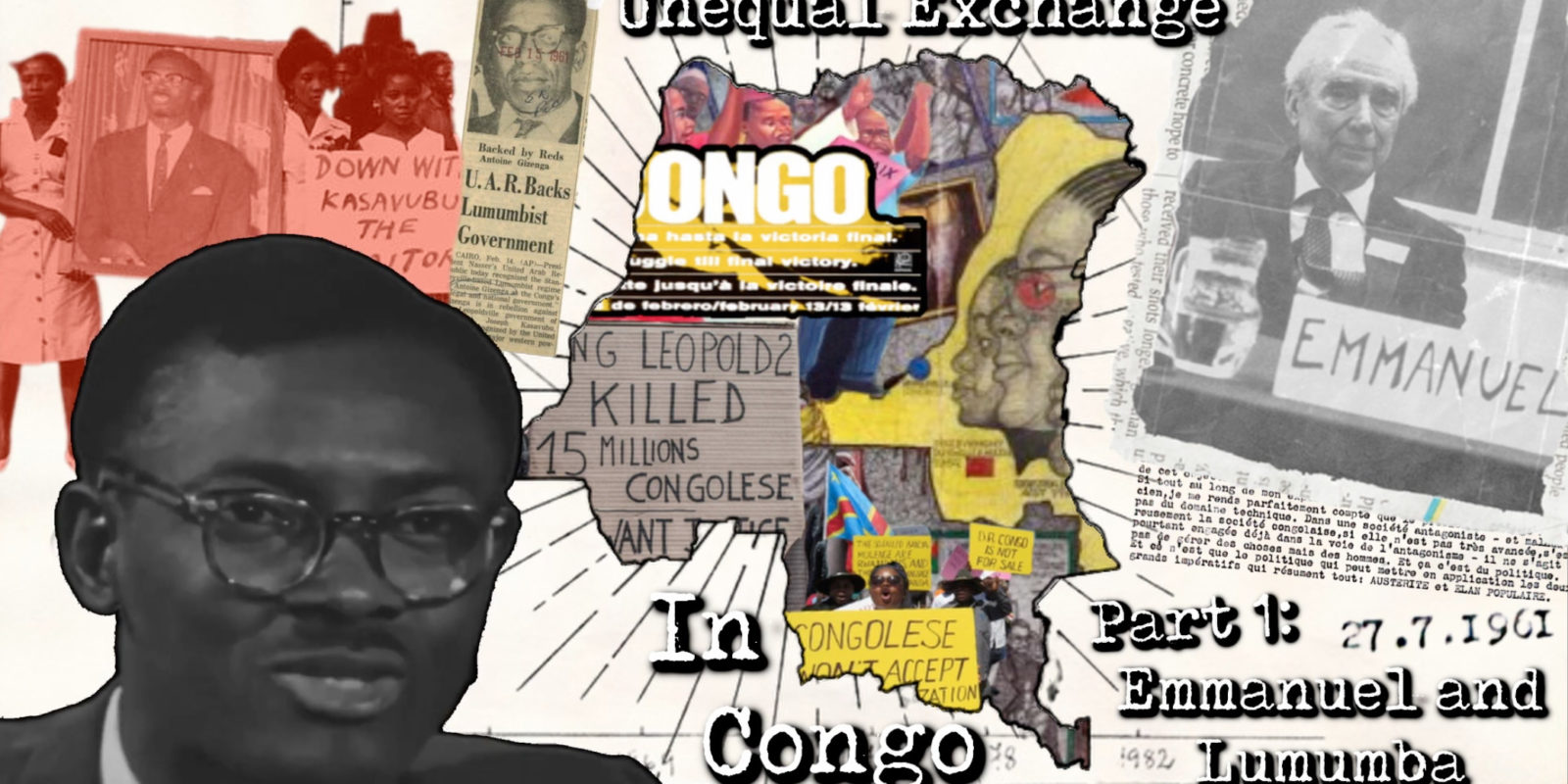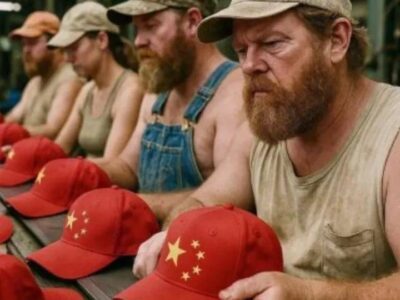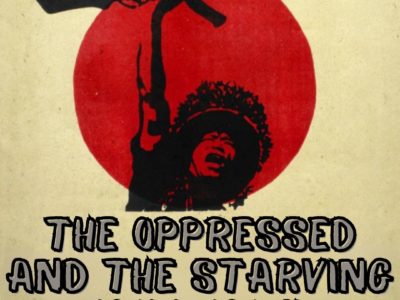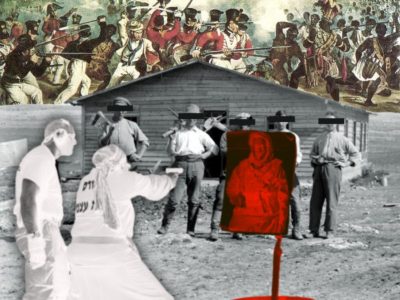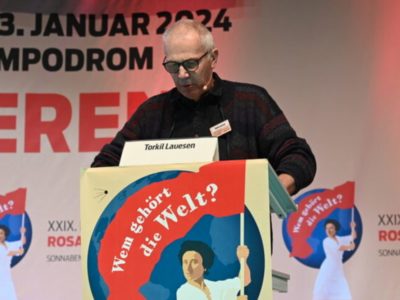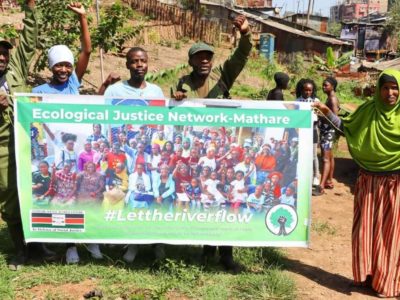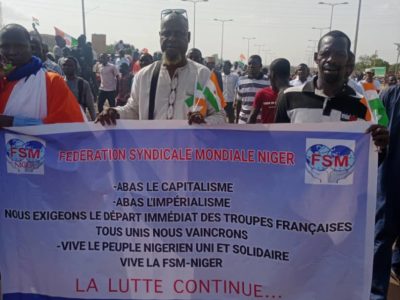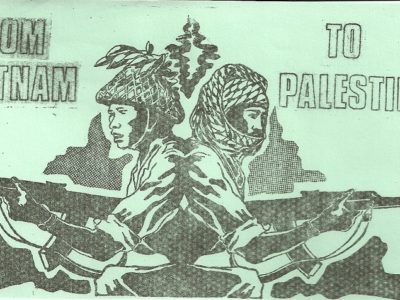Peter
So, with the Congo, we definitely wanted to look at this as a pretty great example of the economic imperialism that Emmanuel focuses on in his work and it’s a really good case study in this whole importance of devalued third world labor in producing these cheap resources for the benefit of the rich first world countries. And the way it plays out in terms of different political coups and military invasions and proxy forces and so on with Rwanda. That’s later on. But then also with Emmanuel, it’s really fascinating looking at Emmanuel’s role in the Congo. And lots of this is new research basically.
Some people have a view of, broadly speaking, Third Worldist economic and political thought as being detached from the real world, but if you have a look at what Emmanuel did in his life, and he’s really like the, the most important , Third Worldist economist, I think it’s fair to say, he was an incredibly active political activist and that’s another great reason to have a look at this whole story.
Joseph
Absolutely. As you mentioned, there’s not a lot of biographical information publicly accessible about Arghiri Emmanuel. There’s no publicly available biography written about him. The best for that information you can get is John Brolin’s dissertation called The Bias of the World, where he talks a lot about Arghiri Emmanuel’s history.
That’s where a lot of this information comes from. And other details come from personal correspondence or information that hopefully we can begin to let more people know about who are interested. So to begin, we can talk about Arghiri’s biography and just talk a little quickly about what we’re going to focus on.
So, although he was born in 1911 in Greece and studied economics and commerce at the University of Athens, he would make this move to the Belgian Congo in 1937 to work in commerce. Particularly, he’s working as Brolin notes in his family textile trade. So he likely worked as an accountant and helped keep track of the textile trading.
He was also a communist early on. So he had very clear political involvement stemming from his university days, and he had carried this on into the 1940s when World War II broke out and he was fighting on the side of the Greek communist partisans in the Greek civil War. He was jailed in 1944 when they led an uprising against the Greek government in exile in Cairo, which is probably a whole story for another day about the Greek civil war.
It’s very fascinating. After he was jailed in 1944, he was sent to a prison camp in Sudan by the British Administration, which was on the side of the Greek government in exile in Egypt. And, during that time in that camp, he was able to write a textbook on dialectics and he was actually teaching other prisoners dialectics.
So again, another story perhaps, but very interesting. And then, he escaped from that prison in Sudan. Luckily, after he escaped, he was pardoned, and he made an apology or confession, not of guilt necessarily, but just of his involvement in this uprising against the government.
Then after he was pardoned, he returned to the Belgian Congo where he would join up with Patrice Lumumba’s Congolese National Movement as an economic advisor. He would write a lot of articles for the Stanleyvillois, which was a newspaper. And he made a lot of observations, particularly around the fact that settlers who were arriving in the Congo, a lot of Greeks in particular, would play a very interesting intermediary role, with respect to economics as merchants and small traders. So Emmanuel made some observations on this. We’ll get into more of what happens as he is advising Patrice Lumumba.
That’s the basis of what we want to talk about today, and then what happens in the 1960s as the Congo crisis erupts. Emmanuel is personally taken hostage and he is doing a lot of his work advising the resistance that emerges as Patrice Lumumba is deposed and executed in the Congo crisis when multiple factions emerge.
So that’s the basis of our episode today and how it informs 1960, ’61 when he’s advising in ’62 when he leaves and goes to France and publishes Unequal Exchange, his major text for the first time in French, and then later on. Another source for this episode is his article, “White Settler Colonialism and the Myth of Investment Imperialism”, which has a lot of reflections on his time in the Congo.
So to begin, maybe we can talk about how his time in the Congo helped to develop unequal exchange theory. And this is based on a few of his 1950 articles that he wrote for, which has a lot of ideas that relate to unequal exchange.
In these 1950s articles for Le Stanleyvillois, Emmanuel writes a lot of very interesting critiques around what he’s observing in the Congo.
So one, for example, is these buyers unions that are being set up by settlers and merchants. Essentially what they’re doing, they’re like consumption organizations. So they’re arguing against the commercial gains tax that’s being placed on consumption goods in the Congo. They want the administration to lower these commercial gains taxes, and they want to make consumption more affordable in the Congo. And Emmanuel makes a lot of these arguments with respect to consumption and the organization of settlers and merchants; a lot of his arguments are related to the fact that he’s very critical of this view that monopolies are the main problem when it comes to imperialism.
In his opinion, it’s not just monopolies, but it’s also settlers and merchants, like the small intermediaries who do the work of capitalism when going and traveling, they promote trade and they promote this unequal exchange, which we’ll discuss. So that’s one instance of the things he is noticing.
He’s observing certain commodities. So, for example, Brolin has this really interesting note in one of his articles where Emmanuel is studying a few example commodities like a textile blanket, some different grapes and then fish. And he’s observing how, for example, this blanket, it’s costing 75 francs in the Congo where it’s being exported to by Belgian traders or Greek traders and then it’s costing 89 francs in Belgium where it’s actually produced. And he literally says two steps from where it’s produced it’s 89 francs and Brolin concludes that this is one of Emmanuel’s first observations on international prices and remuneration of distribution being higher in Belgium than in the Congo.
Another thing with respect to unequal exchange theory is his observations around the mobility of capital and the equalization of the profit rate. So he notices that Greeks in the Congo helped to promote this equalization of the rate of profit in the long run by actually doing the business of going out and trading.
And in addition, he’s very critical of, again, the views from this one school of thought of the left, which says that monopolies are just the problem because he looks at how the Union Minière of Belgium, the main mining company, promotes a lot of movement of capital and doesn’t necessarily block the movement of capital or act in a monopolistic way, but promotes the equalization of the rate of profit.
And why are these points important for Emanuel? First with respect to consumption, then especially the rate of profit and equalization and looking at commodities and seeing why is it that his theory revolves around saying the commodity could actually be more expensive in Belgium than it is in the Congo?
Peter
Yeah, it’s really fascinating hearing you talk about these early ideas of the Emmanuel back in the 1950s. And you’re saying things which are still very contemporary, especially talking about the price differences between low wage and high wage countries, which is something that lots of contemporary analysts of economic imperialism focus on as well. Think about John Smith’s book about imperialism, where he begins by comparing the different price of something which is produced for cheap in Bangladesh and sold for a very, very high price in London, in the global north.
With the first point about the critique of the buyers’ unions, I think it’s a really key aspect of Emmanuel’s thought that poor low wage countries have a disadvantage in the capitalist system. He also argues that under capitalism, the poor countries are necessarily disadvantaged precisely by increased liberalization and precisely by increased market trade with the rest of the world, which goes against the idea that the problem isn’t trade, but the problem is some bad government decisions. And Emmanuel’s work does a really great job of critiquing this idea. Lots of contemporary studies of these Price differences, global imperialism between poor rich countries, they focus on how the higher wages of the richer country are what allows it to capture more value from, say, the global value chains despite not doing actually more work just because of these political conditions where their workers are allowed to have higher wages because their lives are valued more in the current world system. Because of that, those countries are able to appropriate more value.
In these early articles, does he also focus on the wage differences as being the root cause of these price differences?
Joseph
It’s really interesting to bring that up because he’s especially noting that wages of the Congolese workers are so low compared to those of the settler Belgian workers.
What you were saying about noticing that the remuneration of the two commodities is different is I think one of his first inclinations on the equalization of the rate of profit. So he’s not saying, I’m gonna go down this path and see, okay, maybe it’s something has to do with different rates of profit or different rates of productivity.
Once he rules that out by saying there’s an equalization of that rate in that same article, I think it’s there that you have the theoretical opening of saying, if it’s not this factor of price of production, it has to be the other, the only other factor, variable capital. And pairing that with these observations he makes at the time in some other articles talking about just how bad wages are and how low they are for Congolese workers in particular, I think he would’ve definitely been picking up on that.
Peter
You were talking about how important it is that he focuses on this tendency towards equalization of the rate of profit and this was really a really important breakthrough that Emmanuel did because so much work, especially on the left by different Marxists on colonialism and the reasons for divergence in economic development between formerly colonized countries and first World European colonizer countries, they always focused on this idea of there being these insidious monopolies that extract absurdly high rates of profit in the third world and that in so doing, they immiserate the colonized countries by taking everything through these high rates of profit. But then Emmanuel’s work just as someone who actually lived in a colonized country and also worked as a small businessman, he saw with his own eyes this wasn’t really true; that he had actually quite similar profit rates, that there was plenty of movement of capital, that the monopolies weren’t shutting off the market to all capital. Lenin and Hilferding and so on, all those early 20th century, late 19th century theorists of imperialism, they always focus on monopolies and high rates of profit.
It’s really an incredibly important breakthrough Emmanuel made already in these early works based on this experience.
Joseph
When we talked about white settler colonialism earlier, that other article, a lot of the basis of that article, and honestly a lot of the basis of unequal exchange is a critique of the left and critique of aspects of Leninist analysis of imperialism, and that Emmanuel’s work is really designed not to say monopolies are not bad or justify monopolies, but instead to say that that analysis is only part of the problem. In particular something that comes out with a lot of his work relating to the Congo is that he’s saying a lot of the left, whether it’s the Belgian left or the settler left in the Congo itself, a lot of their energy goes towards criticizing monopolies. And so they give a pass to the smaller merchants and capitalists who actually do the work of equalizing the rate of profit, actually do the work of spreading capitalism and trade.
In particular the political conclusions of that are really devastating, which we’ll see in a little bit. I just want to go through very quickly some of his other points that he’s not necessarily writing or observing in the 1950s, but that he picks up later on in his 1972 article where he takes a lot of these observations that he had and integrates them into an unequal exchange framework.
Some of those in particular will help give context to what is happening in the Congo as he’s there and as independence occurs. So he writes about how, for example, on the eve of independence, the Congo has a national income of more than 50 billion francs, and that this revenue is divided approximately in half between 110,000 whites and 14 million Congolese on the other hand.
So just this devastating disparity of wealth in the Congo. And one of the reasons that he’s very precisely observing that is that the base salary for a white employee could be anywhere between 15,000 francs a month to 45,000 francs a month. So having this range around, especially what their salary is based on what their consumption is.
The white settlers would be able to obtain villas. And then in comparison, the average income for Congolese workers is around 2000 francs a year. So a very intense income disparity and that wage difference is absolutely what he will talk about with respect to unequal exchange.
He also notes that the proletariat of the Congo was very numerous. There were around 1 million and a hundred thousand employees, so compared to other countries on the eve of independence, the Congo had quite a high classical account of what would be a proletariat. But in spite of that, and again, I think speaking to the state of an underdeveloped capitalism in a colonized country, the settlers in the Congo would still use forced recruitment and forced labor.
So it’s not as clear to say that there is an organized waged proletariat and it’s moved past all forms of feudalism because there’s slavery still occurring in the Congo at this time. Another really interesting observation he makes is he points to the status of clerics, what is known as the elites or evolué in French.
He actually characterizes them as their own sort of labor aristocracy within the Congo, especially with respect to the status of other Congolese workers or proletariat when independence comes, because you have this whole class that is considered more upwardly mobile, often serving in the bureaucracy.
And he notes that they’re literally like a class into their own. This is the potential basis for a national bourgeoisie. But he’s very clear in saying this is more of a comprador class, more of a lumpenbourgeoisie as Andre Gunder Frank would put it. He makes some very interesting observations in his writing about how during the move to independence, a lot of strikes that were occurring would be demanding for the end of the high salaries of clerks, demanding that this evolué class have its own reduction in their wages and seeing pretty clearly I think that the movement that’s developing in the Congo at this time is both enraged at Belgian colonialism, Belgian settlers, but also a comprador class that’s emerging, which I think is a really interesting insight.
And he makes some observations about how this class, in particular post-independence, is looking for the same standard of living as the white civil servants that they are after independence seeking to replace. I think it’s very interesting to see this early critique of what’s going to be the state of affairs post-independence and a very clear siding with the lower classes, the lower stratum in the Congo, particularly the proletariat that has a very low wage, but even beyond that, the forced labor of the peasant class.
Peter
It reminds me of another book that we’re reading for this podcast, which is by Georges Nzongola-Ntalaja, called “The Congo From Leopold to Kabila: A People’s History”. And it also takes aim quite often at this evolué class, which was the ruling class in basically all the post-colonial independent African nations, and often with this tendency to really favor the colonizing culture.
One of the really fascinating things about the colonial attempts to create a loyal administrative class is that this often backfired. And this led to ethnic conflicts in the newly independent countries.
In the Congo, the Belgians, they supported the Lulua, as this minority that was favored by the colonial administration. And then they also educated them more than they did the majority Luba group. But then it ended up being that the Lulua, which had been favored, they actually ended up going against the Belgians.
This was already in the 1950s, 1940s. One of the most active pro-independence forces because they’d been educated. And now, they wanted to have more privileges as this administrative class that had to be in charge of the government themselves, rather than answering to the Belgian colonists. And then in response, the Belgians started supporting the Luba, the majority. This resulted in ethnic violence that was often fanned by the Belgian administration, in the hopes of weakening the independent Congo.
This conflict was also a really important episode in the assassination of Lumumba because the ethnic conflict was taking place in the Kasai area. There was the secession attempt, which then the Western Powers really critiqued Lumumba for supposedly engineering a genocide there, in the attempt to quell the secession, and then this was used as justification by the UN and the Western powers to start really limiting Lumumba’s powers.
In Rwanda also the Colonial Administration, they always supported the minority Tutsi group and they gave them various privileges, which they already had before colonization. But then the Belgians really exacerbated these privileges. It resulted that there were some Tutsi independence activists towards the end of the Belgian colonial period.
But then Belgium in response started supporting reactionary Hutu groups, which led to a large swell in different ethnic violence in the late 1950s, which was called the Hutu Revolution.
Joseph
I think that relates really well to the next part I wanted to talk about, which is some of Emmanuel’s observations around putting the Congo into its proper context historically.
One aspect that we forget, at least in a lot of analysis we forget about is that the Congo was a settler colonial country, especially in the Katanga region. And this directly influenced the relations that were coming into play amongst the various nations or ethnic groups within the Congo that had been colonized, how they perceived one another around this settler class that had developed, as Emanuel mentioned, to around 110,000 people.
But it’s very interesting, a lot of his writing where he talks about this balance of forces: how is the Metropole playing different groups off of one another to maintain what its interests are? And the settlers are not necessarily, and I think as Emmanuel argues quite clearly, not actually just an extension of the Metropole’s interests, but have their own set of interests as actors.
Emmanuel in particular, he’s talking about how the settlers are the most resistant to Africanization and independence. They believe that in the Katanga region, they would rather set up an apartheid state similar to South Africa or Australia or Rhodesia. They would rather have this independent white state in the Congo than succumb to independence. And Emmanuel makes a lot of really interesting observations as to how this is going to relate when the Katanga secession crisis comes up. Who is actually backing Moïse Tshombe, which I think is directly related to what you’re saying around how different actors pick and choose forces that they’re going to support when the balance of forces comes into play.
One of Emmanuel’s main points of saying all that is to figure out why it is, especially when it relates to Tshombe and the Katanga secession, that a lot of the left globally will sort of misidentify the balance of forces and what’s at stake with a false analysis of the situation that often gives a pass to the settlers or the actors on the ground who are actually making the life of the Congolese people worse. And in particular, in his 1972 New Left Review article, he says all of this analysis based on anti-monopoly, pro settler analysis that comes out of the different colonial newspapers like Le Colonial or Le Stanleyvillois … He refers to these settlers as the ultras, who want an apartheid state.
Peter
That was also a term from the Algerian war … they also called those French settlers that tried to create a white ethnostate in Algeria.
Emmanuel also talks about them in Unequal Exchange, about how the composition of these extremist white supremacist forces in Algeria is that they weren’t the richest white Algerians. The richest white Algerians, they were essentially fine with the independence of Algeria.
They could adapt to it, essentially. But for the white working class, they had the phrase, “it’s either the bullet or the suitcase”. They had no choice but to fight to the death, basically, for their position. Otherwise they had to leave the privileged position in the settler colony.
Thank you so much for bringing that up actually, because that’s very related to when he is making these different comparisons, of Algeria and then the Katanga secession.
Joseph
It’s great to have that example from Unequal Exchange too, because I think that illustrates what his point in that section that he’s talking about is. It relates to an acquired wage being something that will motivate these different actors politically.
And so with this analysis that Emmanuel has, which I think is very similar to a critique of settlers and the white working class adoption of settlers and all of its privileges that other writers like J. Sakai in particular have picked up on, Emmanuel shows really even before that text or before a lot of the contemporary criticism, he’s very perceptive around what the interests of settlers actually are. I think he’s very critical of the left, seeing them as “petit blancs”, so just these little, and emphasizing the little, like they’re a small actor. They’re a small working class who is being oppressed by the monopolies and could be a revolutionary force.
But he’s very clear that any time that they have a political expression, like one of these figures, Charles Bonte, who is a Belgian extremist, an ultra-settler who goes around the Congo preaching the adoption of apartheid in the 1950s. And he notes the Katanga secession is not the first instance of secession in the Congo.
The Belgian government had discovered three separate plots in 1960 aimed at proclaiming the independence of Katanga, and this is before it’s actually going to occur. He talks about the fact that a lot of these militants had contacts in Rhodesia, so this network of White supremacist settler states around Africa at this time and that the first attempt had been made as early as 1946. So there’s a long history.
I think this really helps to critique a lot of writing around the Congo that presents, honestly, a lot of the history like it just happened all of a sudden for really no reason. Like when they talk about the Katanga secession, you rarely get the context that there is a lot of interest behind the secession happening.
They present it, in the 1960s, like Tshombe woke up one day and wanted to secede from the Congo. But there’s a lot of history behind these interests, particularly of these settler interests.
All of this helps really clarify Emmanuel’s position. And he has this great line where he says that a lot of these false positions or false analysis makes for “grave misunderstandings and prevents any true dialogue between revolutionary Marxism and the decolonized peoples”. So there’s a constant emphasis on saying, how do we actually make an analysis that makes anti-imperialist struggle possible, that looks at what are the actual balance of interests within the underdeveloped countries that the left has often made this anti-monopoly, support of the little guy. And he makes many examples of how Lenin had picked the side of the Boers in the Anglo-Boer war against the English and all these analyses that don’t really get at the heart of taking a very principled position in support of the anti-colonial struggle.
Peter
I really like his work on this, his critique of these different historical positions on various wars in the third world. He also mentions Mao’s support for, in Nigeria, the Biafra secession. I think his work is a really great illustration of analyzing the internal dynamics going on in the country itself, because often there can be a dangerous tendency on the left to romanticize different events happening in foreign countries and support some side because they’re fighting against the bigger enemy.
And it’s similar, what you’re saying about this romanticization of the petite blancs; because they’re weaker than the big business, so that means that they must be a progressive force. But, what you can see is that often the sort of forces that might seem maybe weaker, they have a much more reactionary program for society. Which means that it’s not really so simple as just always root for the underdog, this American- style, Hollywood style looking at things. But you really need to have a look at the economic interests of these different social groups in the context.
Joseph
I think that relates really well to the next section.
We want to talk about the analysis of the Katanga secession. Before we do that, maybe just a little bit more context as we’re moving historically into the 1960s. I think many people are familiar with Patrice Lumumba, but not knowing exactly how Emanuel came to know him and came to be an advisor for him.
So Lumumba was an activist. He formed the M. N. C., the Mouvement Nationale Congolais. Lumumba’s exact political philosophy, definitely early on at least, was more nationalist oriented. It was more of a purely independent struggle… not necessarily to attribute any illusions on Lumumba’s part, especially when he is very clear about fighting colonialism, and independence meaning an economic liberation.
But one thing that Emmanuel makes a lot of interesting points about is that Lumumba was backed initially by high finance, by the Belgian Liberal party, which I think saw all of these secession plots taking place by the white settlers and their allies in the Belgian Socialist party, saw that to keep control of resources and of labor in the Congo, they would support a flag independence rather than this sort of secession attempt, which would lead to something like a Rhodesia or a South Africa. And in the worst case, as his analysis shows, the worst-case scenario is a new United States, in terms of complete independence and creation of a white ethno-state.
Peter
The high finance was worried because in these situations, these white national states were very economically protectionist, and made it a lot harder for existing foreign capitalists to enter and use the resources at will.
They placed more different stringent priorities, this national-socialist manner of serving the dominant white ethnicity. So it wouldn’t have been good for these big business groups essentially.
Hopefully we can talk about the role of apartheid South Africa in the, in the world system, about its relation to the broader centers of global power and capitalist power in the US, but also whether there was some sort of tensions between them in terms of control over the resources and so on.
Joseph
When Emmanuel’s talking about this, especially as he’s writing in the seventies, for these later articles, something in the background of all of them is apartheid South Africa.
The secession attempts in Katanga failed. There’s not enough of a settlement in the Congo to perpetuate a similar situation. But I think the implication is, whenever he is writing, for example, he’ll make these little points: this is the same case as we can say for the other white settler ethnic states that have established themselves in Africa. And I think clearly Rhodesia and mainly South Africa are the two.
People can misread this argument as “he’s saying that high finance or the metropole cares about the colonized populations, they really want to support independence against an apartheid structure”.
His analysis is more of a pure cut, “what is the economic interest at play?” And the metropoles are very clearly losing if America style or apartheid style has its own domestic capitalism, even in the case of South Africa, has developed its own industry over time, begins to act in its own imperialistic way… that it’s always in the interest of the imperialist countries to make sure they are the sole profiteer of labor and resources.
South Africa developed a very high standard of living for its white population through its own domestic exploitation, when all of those resources could go flowing to the global north. And that plays a role with respect to South Africa’s own role in destabilizing the Congo. Later on, they’ll support Mobutu and use the Congo against the M.P.L.A. and Angola all to perpetuate this exploitation of resources and diamonds in particular.
But before going further down on that side, just to make a brief point about how Emmanuel may have come into contact with Lumumba. Brolin makes this really interesting note that Lumumba was in Urban Associations called the Cercles.
He was the head of one of these urban associations, which also were primarily designed for alumni of some of the Colonial Christian schools. This was the way to get an education, the way to gain access to political circles and political connections.
And Emmanuel likely through these networks as he was going in the Congo, would’ve come into contact with Lumumba’s movement. He was offering economic policy advice, in particular as the independence movement was trying to figure out what its orientation would be.
Emmanuel is not offering how to immediately transition to socialism. He’s not being brought in as a technocrat in nationalization, but his advice was primarily around what to do with respect to trade policy.
Through a lot of his writing it becomes pretty clear that his interest is in balancing these forces and trying to navigate a clear path.
And as we’ll see later on, he’s very clear about what the balance of forces would be, and he is making a lot of advice with respect to how to transition towards socialism and how to make a uniquely Congolese form of socialism.
Which is where I think it’s pretty clear that his policy advice for Lumumba was socialistic in character. Even if overtly a lot of the movement is not necessarily a communist party, it’s more of an independence movement.
Peter
When did Emmanuel start advising Lumumba?
Joseph
Around 1955-1956, it’s early on, and it’s before Lumumba becomes Prime Minister. It’s also before he is imprisoned, which is in 1957, and then is released and then becomes the Prime Minister.
One of the key debates as Lumumba comes to power is what the future of the Congo as an entity should be. The ethnic tensions that the Belgians stoked are colliding and calls for the Congo to be broken up into multiple ethnic states are intensifying. Lumumba is resolutely against this, as was Emmanuel, and calls for all of the Congo’s different ethnic and linguistic groups to join as one nation.
Peter
Lumumba’s M.N.C. was definitely the more progressive section of this evolué class that was committed to some sort of United Congo that could best use its economic potential rather than splitting up into ethnic infighting manipulated by foreign powers to keep it weaker. So we can see Lumumba as this real patriot, this big critic of Belgian colonialism.
Joseph
We see a real contradiction here as the Congo is gaining independence: on the one hand, control of resources and labor, which both Lumumba’s MNC and Belgian finance believe is more possible under a centralized, united Congo; as Emmanuel writes, Belgian high finance “remained resolutely ‘unionist’” (43), but with the belief that they could continue to control a neocolonial Congo. And on the other hand, a desire to promote secessionism and devolution from a centralized state, which is promoted by ethnic Congolese parties opposed to Lumumba and the settlers. But ultimately, Belgian finance could not reconcile itself with Lumumba, and would join with the secessionists to remove him.
For Emmanuel [writing in 1972], he’s trying to figure out the question: how did Belgium’s preferred outcome of having this party that’s not socialist turn into a situation where they have to destabilize the entire country, perpetuate civil war, perpetuate secession, to guarantee their interests? Part of that is Lumumba’s unexpected turn towards radically militant anti-colonial positions.
Peter
There was this one really famous event which took place: the granting of independence to Congo by Belgium. And it was done in this sense of, “Oh, the Belgian state, the king has decided in his infinite wisdom to give you independence, and we continue working together in the future, and Belgian has done so much good for Congo”.
And the king gave this whole speech, and then he expected that they would all clap. But then, Lumumba stood up and he gave this speech really attacking Belgian colonialism, this very radical speech, which resulted in lots of ovation for him and then obviously lots of hatred against Lumumba from these conservative, colonial sections of society.
And there were plenty of parties, these very conservative parties, that were opposed to Lumumba. These were a mask for reactionary white settler interests.
Joseph
These white settler interests, infuriated by Lumumba’s attacks against colonialism, found an ally with one of these reactionary parties that promoted secession. Moïse Tshombe, who was a descendant of Lunda royalty and an ethno-nationalist for the Lunda in Katanga, led a Lunda party called the Confédération des associations tribales du Katanga or CONAKAT. CONAKAT formed an electoral alliance with the Union Katangaise party that represented the white Belgian settlers of Katanga. Tshombe was useful to the settlers to offer an African opposition to Lumumba, and Tshombe consistently accused Lumumba of being a secret communist ready to take support from the Soviets.
The Belgian settlers are the ones who take these first steps in reaction to [Lumumba] telling the truth about colonialism. He talks about King Leopold, and he just says the truth of the history.
Their immediate reaction to that is, “this guy is a Soviet puppet and needs to be dealt with”, this total 180 from “Lumumba could be acting in the interest of finance” to “Lumumba is going to be taking weapons and aid from the Soviets”. Only after the Katanga succession, only after the white settlers begin violence in the country, Lumumba moves towards [thinking] “the West, is not gonna help me here. The United Nations is not gonna help. So I have to take aid from the Soviets”… which represents more than anything a strategic recognition that the Soviets are the only force that could bring aid in his situation.
But as the Katanga secession emerges Emmanuel makes a lot of really interesting points about who starts it and then how it goes. He has this note in his 1972 article where he says “Belgian capitalism was faced with the fait accompli of a break with Lumumba following the mutiny of the local army and the other troubles stirred up by the settlers that obliged Lumumba and Kasavubu to appeal for help to the Soviet Union”. So only after the Belgian settlers began backing Tshombe in Katanga, begin pushing secession in the white, not necessarily an ethno-state as such, because it is led by Tshombe, but clearly backed by settler interests. Lumumba has, on his side of things, a lot of tension with the Congolese independent army, which wants to get rid of white officers.
Peter
That’s exactly what I was about to talk about, actually.
Joseph
Yeah, go for it.
Peter
It’s clear that quite shortly after he’d taken power, the West was fairly antagonistic towards him because you already had UN, US support to the secession, which was being really wholeheartedly supported by the Western powers, and this was right after [Lumumba] takes [Soviet] support. And then also the West is supporting these different 5th column, traitor elements in Lumumba’s government like Tshombe and Mobutu and so on. But the thing about the problems in the army… I just brought up that People’s History of the Congo book because it has a really interesting section talking about this, the uprising by the soldiers in the army that were demanding the Africanization of the army, removal of white officers and they were also demanding a reduction in privileges for the upper officers as well in terms of pay. And Lumumba refused, said “No, there has to be more training, you need to be trained more to get these higher privileges”. But then, and this is a point that’s made by the author Nzongola-Ntalaja, people responded like, well, “what training have you guys got, the evolué that have taken control of the of the country following independence, you guys also don’t really have that much education and but you’re getting these huge privileges”, and there’re these important uprisings against the newly independent government.
The book also talks about how having acquired independence, Tshombe and different new leaders of the Congo went to Belgium in April, May 1960, this Economic Roundtable conference, and this is where basically the economic fate of Congo was decided, which involved basically giving a huge amount of economic power to the Belgians. Even though political independence had been obtained, economic independence wasn’t. Union Minière, the biggest mining company in Congo, the Belgian mining company, kept 75% of all the country’s cobalt and also in terms of the world, a huge proportion of the world’s cobalt and copper and all these different minerals came from this mining company and after independence it was agreed that it was still basically going to remain in Belgian hands.
Joseph
As Tshombe secured the interests of Union Minière in Katanga, they switched from supporting Lumumba’s vision of a united Congo to backing secession to remove a Soviet-backed state. The Belgian army began training the Katangese army under Tshombe.
I think what Emmanuel identifies in the change in the balance of forces is that Tshombe had turned from being an enemy on the side of the settlers to being an ally of, like you mentioned, the US, of Belgian high finance, exactly because Lumumba had turned to the Soviets.
American Imperialism, of course, had a role in this all, opposed to the Soviets’ military aid coming to Lumumba. President Eisenhower reportedly said he “wished Lumumba would fall into a river full of crocodiles”. The CIA backed Joseph Mobutu, who would launch a coup against Lumumba, and then arrest him on December 1st, 1960. On January 17th, 1961, after being imprisoned and tortured, Lumumba was deported to Katanga, where he was executed by Belgian and Katangese mercenaries.
American and Belgian imperialism had allied with Tshombe and the settlers in Katanga to commit this heinous crime. But the imperialists were playing the long game, and still were fundamentally opposed to the settlers in Katanga. After using Tshombe to kill Lumumba, Emmanuel writes that the imperialists turned on him: “The ‘Western’ reflex may have taken precedence over other considerations. If this is true, their attitude only represented a brief moment of opportunism. Soon, with the neutralization and then the physical elimination of Lumumba, Tshombe and his secessionist state once more became the main target for the imperialist offensive” (42), to crush the Katanga secession and the settlers’ aspirations. In the end, instead of Lumumba’s pan-Africanist, united Congo, the imperialists would promote “Zaïre”, a neocolonial, centralized regime under Mobutu open for extraction.
I want to turn to this interesting footnote that Emmanuel has in his 1972 article on Lumumba and Tshombe, which I think reveals a little bit of his thoughts around the time.
He says:
“Let me not be misunderstood. The fact that Tshombe was attacked by financial imperialism does not therefore mean that he played a historically progressive role. On the contrary, it means that in an unprecedented historical conjuncture, this role was played by international high finance. Tshombe personified the threat of complete enslavement and probable physical extermination which then hung over the Congolese people and which still hangs over Africa as a whole”, which I think is another reference to Apartheid South Africa. “This threat comes from the white settlers. In comparison, the international high finance, which fought Tshombe, represented and still does represent the lesser evil for that part of Africa. This explanation is necessary because at a previous presentation of my thesis in Paris, one of the participants in the discussion reproached me with presenting Tshombe as the good man and Lumumba as the traitor. I do not know which part of my text could have caused such a misunderstanding, which has me saying the exact opposite of what I think. Tshombe was quite simply the total traitor, but there was no treason in the policy of alliance with high finance in order to resist the mounting pressure of the settlers in the given circumstances. This was the vital interest, the only possible salvation of the Congolese people”. (42)
I think this is interesting with respect to the balance of forces that is occurring within this time period and Emmanuel’s position. Emmanuel is watching as this is occurring and sees Lumumba get removed from power. On his own biographical note, Emmanuel had been kidnapped and deported from the Congo by settlers [in July 1960], he was deported to Nairobi, Kenya, and this is likely because as all these tensions begin to explode, he’s identified as being a traitor on the side of Lumumba, a traitor to the capitalist white settlers because he’s been aiding Lumumba. Even though he’s deported, he continues directly advising the Congolese movement based around Antoine Gizenga, who is Lumumba’s Deputy Prime Minister in 1960, as Lumumba is being imprisoned, as the Congo is falling into a state of crisis.
Gizenga leaves Leopoldville and moves to Stanleyville, which is modern day Kisangani, and he forms a rival government to that of Kasa Vubu and Mobutu, who had arrested Lumumba and imprisoned him and would later lead to his execution. He leads this government, which is officially known as the Free Republic of the Congo, from 1960 to 1962.
Lumumba always had to play this very delicate game of balancing all of these actors between Tshombe, between Mobutu, because he was promoting a United Congo and not an openly Socialist one. But Gizenga more openly says “We’re going to be a socialist Republic in the Congo, continuing Lumumba’s legacy, Lumumba’s thought”. And this government is recognized during this time period by the entire Eastern Bloc, Cuba, Iraq, the United Arab Republic, Ghana, Guinea, the Algerian Provisional government at the time, Morocco… and Emmanuel becomes an advisor, as he had continued supporting Lumumba. He continues on with the Lumumbist faction in the Congo crisis. And he gives, in this letter that he writes in 1961, some really interesting advice to Gizenga on the policies to take in this period of crisis.
He says “maintain postal relations with the rest of the world without going through Leopoldville”, so he’s advising the government not to let their communications fall into the hands of Mobutu and Kasavubu, and he instead recommends that they go through a postal union in Switzerland. He says one thing that’s really important is to establish an airline directly from Stanleyville to Cairo. So he’s clearly advising that they maintain these relations with Nasser’s Egypt with the Third World and Second World that is supporting this government and it the Free Republic of the Congo. He advises them to develop their own infrastructure, look at the prospects of maintaining their own domestic production of gold and gain some revenue for this independent government. And I think really because Emmanuel believes this is going to be a possible socialist government to rival the other ones, he sees it as legitimate to make a transition towards socialism for this breakaway government. He advised them, interestingly, to study the prospects of obtaining foreign aid from the Second World, so make a very clear move in the Cold War. He talks about the need for external finance from either private capital or the aid from friendly states, the socialist bloc. He advised them to have absolutely no consideration for the colonists except for some functions that would be needed, as technicians, engineers, economists, teachers… other than that have no consideration of them as officers, absolutely not in the military. And his last note, he says “be imaginative in seeking formulas for coexistence with the existing trusts in a highly planned economy moving towards socialism”. It’s just really interesting how Emmanuel saw it, giving his advice to transition this breakaway government towards a socialist state in the Congo.
Peter
That really ties in with his later work from the 1980s about the fact that Third World countries really should go to get advanced technology to develop their economies with appropriate government regulation of the transnational corporations in these countries, but that there shouldn’t, shouldn’t fall into this kind of left-wing-Marxist tendency to see them as the ultimate source of all problems. Also in his later book, when you talk about this advice to the Gizenga government, how he advises finding ways to use these large corporations in the planned economy, and in in his later book he also notes how different socialist states like the USSR, China, Vietnam, he uses all these different examples of socialist states that throughout their existence had a lot of fruitful economic cooperation with these large Western transnational corporations. The USSR… even in the 1930s, Ford and top U.S. different companies going to the USSR and giving them various technological assistance, and the USSR also using this as a blueprint for a highly advanced socialist economy.
That’s another part of Emmanuel’s strategic analysis, which is quite realistic about the way the world is going to look in the medium, maybe long term future, a very realistic look at the way in which Third World countries, poor countries should navigate this world and create a more economically advanced and socially just society, but in this realistic, practical sense that is in line with the experience of different socialist countries and their history we’ve had in the 20th century.
I was talking at the start about how in Western Marxism, there’s this attempt to villainize the people like Emmanuel as “they don’t know real Marxism, their heads are stuck in these theories and they don’t want to ally with the working class”, as if the first world working class is the whole world’s working class. But in reality you can see Emmanuel, he’s very, very politically active and really has in mind the lessons of the development of the existing socialist states. You can really see how Emmanuel is a great counterpoint or alternative to Western Marxism, which sort of says “all those socialist states, they were all just awful and evil and so on”. And Emmanuel’s quite positive about them, obviously they. He often writes about the great experience of the USSR and of Socialist China and their relevance to third World Economic development more generally. And you can see this in this cooperation with Gizenga as well, and his recommendations.
Joseph
Yeah, absolutely.
In our later episodes on the subject of the Congo, we’ll talk more about how the history continues from here. Of course, the Gizenga government fell as a result of the crisis in Congo; Tshombe as well. All of this leads the stage to Mobutu, who is absolutely the man of Belgian imperialism, of American imperialism, your prototypical comprador, who will come to power out of all of this.
I think as we continue, we won’t necessarily cover anymore of Emmanuel’s biography, but we wanted to use this as an introduction to say how does having this direct participation in this struggle and observation of the conditions in the Congo on the ground help unequal exchange as a framework to understand what is contemporarily happening in the Congo in the past few decades, with the never-ending plundering of the Congo by the West, through all mechanisms direct, of course, through trade as well. So this framework and this theory really helps us understand what’s happening in the Congo. We’ll trace the political and economic history, and it’s good, I think, for us to have established that part of [Unequal Exchange] theory was formed through being an ally to the continuing liberation struggle of the Congolese people.

